Home / Tulane Hall of Fame honors giants in the profession
Tulane Hall of Fame honors giants in the profession
November 27, 2023 10:00 AM
|
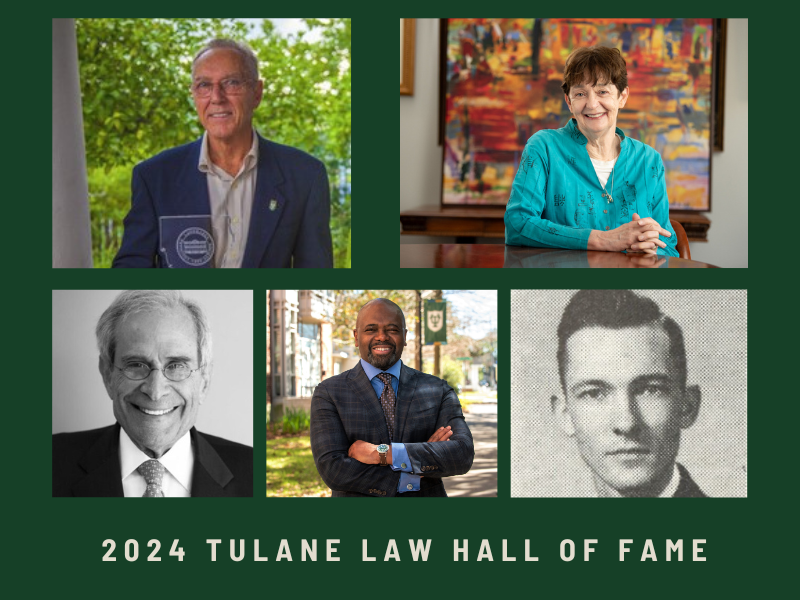
(Clockwise) David Campbell (L'60), Professor Catherine Hancock, retired Judge John Malcolm Duhé Jr. (L'57), Joseph West (L'86) and Louis Fishman (L'65) make up the 2024 Class of the Tulane Law Hall of Fame.
The 2024 Tulane Law School Hall of Fame will honor some of the law school’s most notable alumni and trailblazers whose impact on the school and the profession elevated the legal profession and the global stature of Tulane Law.
This year’s honorees include an alum whose persuasive words led to the desegregation of Tulane University and the preservation of historic landmarks in the state; a long-time jurist on the U.S. 5th Circuit Court of Appeals; one of the co-founders of the enormously successful Tulane Corporate Law Institute; a beloved professor who blazed trails as a giant in the field of criminal law; and a national leader in diversity, equity and inclusion.
The 2024 Tulane Law Hall of Fame Class comprises David Campbell (L’60), a lawyer, environmentalist, preservationist, and author; ret. Judge John Malcolm Duhé Jr. (L ’57) of the U.S. 5th Circuit Court of Appeals; Louis Fishman (B ’63, L ’65), a corporate law giant and co-founder of the Tulane Corporate Law Institute; iconic criminal law Professor Catherine Hancock, whose teaching has inspired hundreds of students in the profession; and equity, diversity and inclusion leader Joseph West (L’86) whose work over decades has brought new voices into the profession and who continues to elevate voices of color in the legal field.
“These alumni represent the very best of Tulane Law School,” said Interim Dean Sally Richardson. “They have each, in their own right, achieved so much in their legal careers, and they have also all embodied the highest ideals of the legal profession and truly lived out the Tulane motto, ‘non sibi, sed suis.’ It is such a pleasure to be able to celebrate these fine alumni and all of their accomplishments.”
The Hall of Fame, in a slightly different format this year as a cocktail hour event, will take place May 8 from 4-6 p.m. at the Royal Sonesta Hotel in New Orleans.
David Campbell (L’60)
Attorney, historic preservationist, and environmentalist David Lee Campbell’s legal research while a Tulane Law student laid the foundations for the desegregation of Tulane University in 1963. His research at the behest of Joseph Merrick Jones, one of the founders of the Jones Walker firm, to research all the legal theories and existing cases on desegregation across the nation, was the basis for the Tulane Board of Administrators to officially recommend the university’s desegregation starting in the fall of 1963, when it admitted 11 Black students. Tulane's libraries recorded his account of the events here.
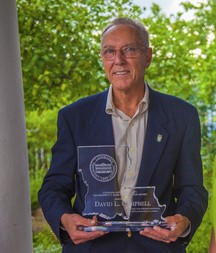
Graduating top of his class, Campbell went on to practice law in New Orleans for 35 years, including at his own firm, and to promote Louisiana’s civil law across the world, and embrace environmental and preservation policies in the region.
Campbell also was an environmentalist and conservationist, preservationist, author and poet, art entrepreneur and civic activist. He became the founder of the Little Tchefuncte River Association and as a historic preservationist, Campbell founded the Peniston-Gen. Taylor Association to successfully stop the Mississippi River Bridge at Napoleon Avenue and then the proposed Riverfront Expressway. An important part of the historic preservation movement of the 1980s, he became the first person to convert a warehouse into a private residence in New Orleans' Central Business district.
A past president of the Preservation Resource Center and the Louisiana Landmarks Society, in 2016 he received the Harnett T. Kane Award from the Louisiana Landmarks Society for significant lifetime contributions to historic preservation. He published his memoir, “A Double Life,” in 2016 and a book of poetry, “Nature all Around Us,” in 2017. In the former, he broke his silence and for the first time spoke out about being a gay man during a time when being gay was illegal, frowned upon and could have cost him his career. In the latter, he wrote about his love of nature in a book of art and poetry.
Today, Campbell lives in Folsom, on land he purchased many years ago and continues to write and advocate for the causes he is most passionate about to this day.
Judge John Malcolm Duhé Jr. (L ’57)
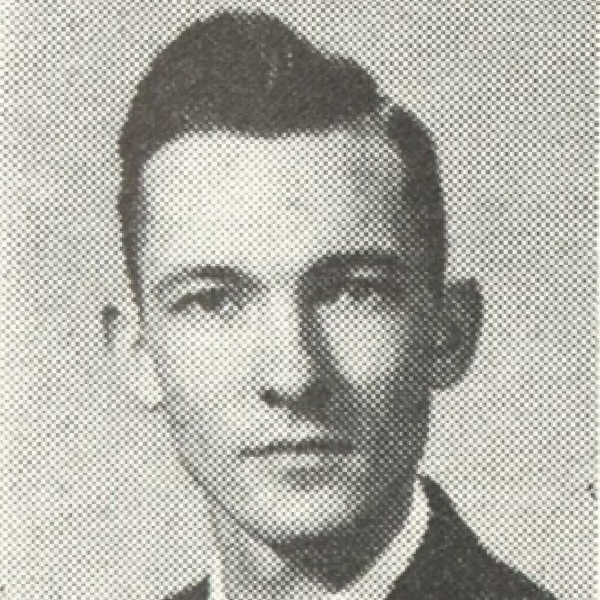
John Malcolm Duhé Jr. is a retired senior U.S. circuit judge of the New Orleans-based U.S. Court of Appeals for the Fifth Circuit. Duhé received his Bachelor of Arts degree from Tulane University in New Orleans in 1955 and his Juris Doctor from the Tulane Law School in 1957. He served as an attorney in private practice in New Iberia, La., from 1957 to 1978. From 1979 to 1984, Duhé was judge of the Louisiana 16th Judicial District in New Iberia.
Duhé was nominated by President Ronald Reagan on May 15, 1984, to a seat on the United States District Court for the Western District of Louisiana vacated by Judge W. Eugene Davis. He was confirmed by the Senate on June 8, 1984, and received commission on June 11, 1984. He ended his service on November 9, 1988, due to elevation to the Fifth Circuit where he served until his retirement in 2011.
Louis Fishman (B ’63, L ’65)
Louis Fishman (B’ 63, L’65), a partner at the New Orleans firm of Fishman Haygood, LLP, is a co-founder of the Tulane Corporate Law Institute, the largest corporate law gathering in the nation, which helped put Tulane Law on the map in the field.
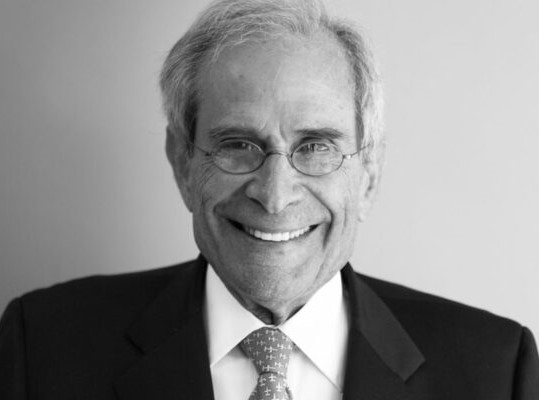
As a founding partner of Fishman Haygood, his practice is transactional, and he is counsel to the firm and a member of their Business Section. His practice includes corporation law, securities, and mergers and acquisitions. He also counsels clients on resolving disputes within family and other closely held businesses.
Fishman is a member of the Advisory Board of Editors for the Tulane Law Review since 1991. He has held several key posts, including chairman of the Louisiana State Bar Association’s Section on Corporation and Business Law and has served as a member of that Section’s Corporate Laws Committee. Fishman is an Adjunct Professor at Tulane Law School, where he currently teaches a mini-course on corporate governance.
Fishman has been listed in The Best Lawyers in America in Corporate Law, since that publication’s first edition in 1983. In 2009, he was named that publication’s first New Orleans Corporate Lawyer of the Year and its first New Orleans Mergers & Acquisitions Lawyer of the Year in 2010. In 2011, Lawdragon named Fishman to its “500 Leading Lawyers in America” guide, which represents far less than 1 percent of the legal profession, and called him “without question one of the very best corporate transactional attorneys in the South.”
Professor Catherine Hancock
Catherine Hancock is the Geoffrey C. Bible & Murray H. Bring Professor of Constitutional Law and teaches Constitutional Criminal Procedure and Constitutional Law at Tulane Law, where she has taught hundreds of students and become iconic in her passion for criminal law, constitutional law and law and gender studies. She has influenced scores of students over the years to pursue not just pro bono work, but to dedicate themselves to careers in the public’s interest, being recognized three times by law classes for her teaching.
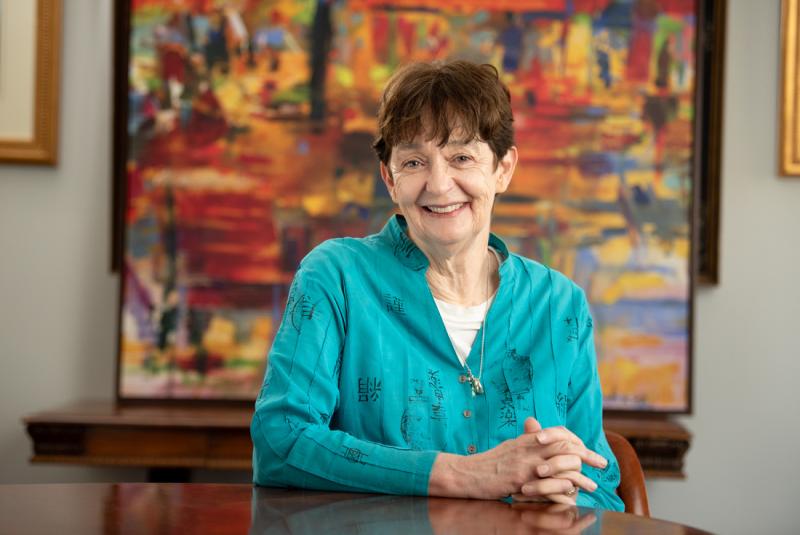
She joined the faculty after a clerkship with Judge James L. Oakes on the U.S. Court of Appeals for the Second Circuit in Brattleboro, Vermont. Her pro bono activities include eight years of service as co-counsel pursuing federal remedies for a death row inmate whose case she argued in the U.S. Supreme Court in 1990. She has co-authored an Aspen casebook on Constitutional Law, a LexisNexis casebook on the First Amendment, and West casebooks on Constitutional Criminal Procedure and Criminal Law.
Her teaching fields include these four subjects, as well as Federal Courts and Law & Gender, and she has taught Comparative Criminal Procedure in Tulane’s summer programs in France and Toronto. Her First Amendment scholarship focuses on issues related to defamation law and hate speech, and her work in Constitutional Criminal Procedure addresses topics such as police interrogations and searches, privacy rights, and the death penalty.
She was honored for her writing with the Sumter Marks Award in 2002 and the C. J. Morrow Research Professorship of Law in 2004-2005. She received the Felix Frankfurter Distinguished Teaching Award from the graduating classes of 1992, 1998, and 2005.
Joseph West (L ’86)
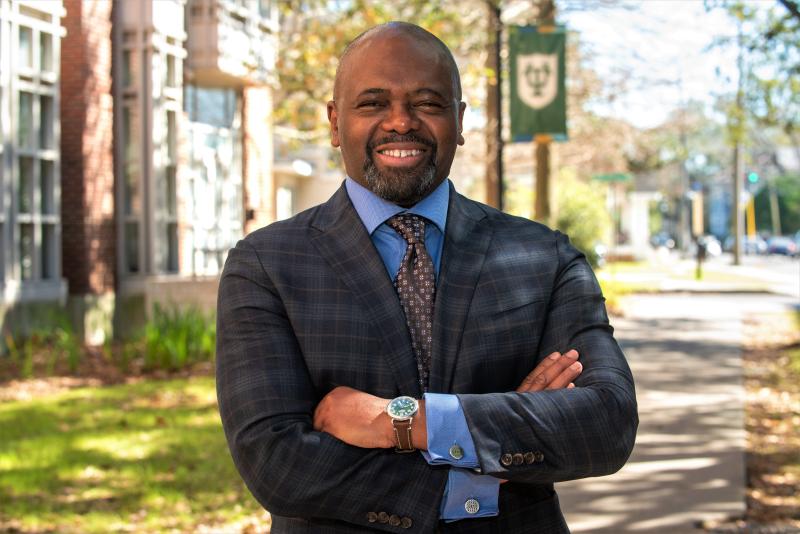
A native of Louisiana, Joseph West is a partner and Chief Diversity, Equity and Inclusion Officer at Duane Morris, LLP. West practices in the area of complex litigation in the firm’s Trial Practice Group. West also leads the firm’s diversity, equity, and inclusion program and consulting practice. He previously served as the President and CEO of the Minority Corporate Counsel Association (MCCA) and is nationally recognized as an expert in diversity, equity, and inclusion.
Read more about West here.
West currently serves as co-chair on the board of directors of the Lawyer’s Committee for Civil Rights Under Law and as a chair of the ABA Section of Legal Education and Admissions to the Bar. Previously, he served on the ABA Commission on Diversity and Inclusion 360, was a member of the ABA Task Force on the Financing of Legal Education, and served on the ABA Commission on Racial and Ethnic Diversity in the Profession. In 2019, West was the inaugural recipient of the Chambers and Partners’ Lifetime Achievement Award: Diversity and Equality.